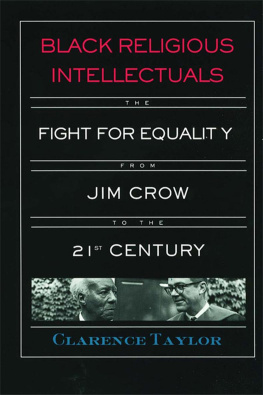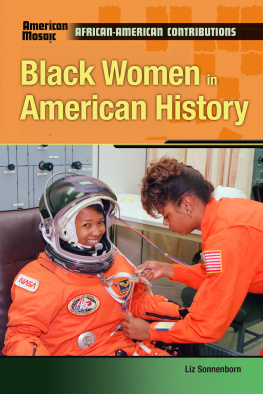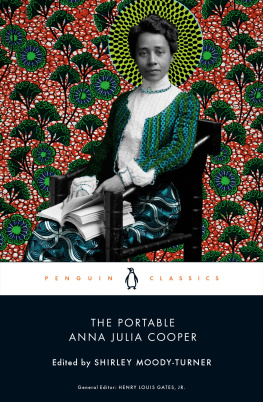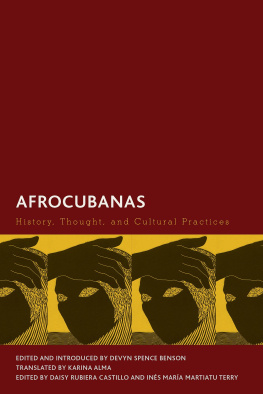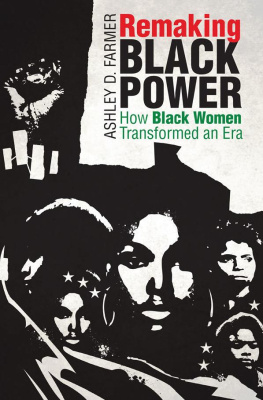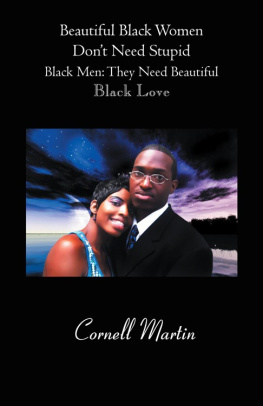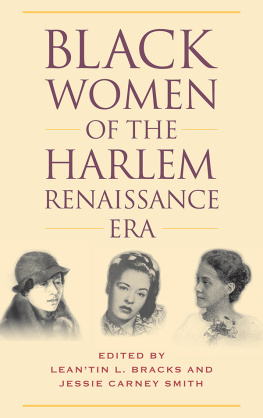Toward an Intellectual History of Black Women
THE JOHN HOPE FRANKLIN SERIES IN AFRICAN AMERICAN HISTORY AND CULTURE
Waldo E. Martin Jr. and Patricia Sullivan, editors
2015 The University of North Carolina Press
All rights reserved
Manufactured in the United States of America
Designed and set in Whitman by Rebecca Evans
The paper in this book meets the guidelines for permanence and durability of the Committee on Production Guidelines for Book Longevity of the Council on Library Resources. The University of North Carolina Press has been a member of the Green Press Initiative since 2003.
COVER ILLUSTRATION: depositphotos.com/piotr_marcinski
Library of Congress Cataloging-in-Publication Data
Toward an intellectual history of Black women / edited by Mia Bay, Farah J. Griffin, Martha S. Jones, and Barbara D. Savage.
pages cm. (The John Hope Franklin series in African American history and culture)
Includes bibliographical references and index.
ISBN 978-1-4696-2091-6 (pbk : alk. paper)
ISBN 978-1-4696-2092-3 (ebook)
1. African American womenIntellectual life. 2. Women, BlackAtlantic Ocean RegionIntellectual life. I. Bay, Mia.
E185.89.156.T69 2015 305.48896073dc23
2014028953
The essays by Farah J. Griffin, Kaiama L. Glover, and Sherie Randolph appeared earlier in somewhat different form, respectively, in Farah Jasmine Griffin, Harlem Nocturne: Women Artists and Progressive Politics during World War II (New York: Perseus Books Group, 2013). Reprinted with permission of the publisher; Kaiama L. Glover, Black Radicalism in Haiti and the Disorderly Feminine: The Case of Marie Vieux Chauvet, Small Axe 40 (2013): 721. 2013 Small Axe, Inc. All rights reserved. Reprinted with permission of Duke University Press; and Sherie Randolph, Not to Rely Completely on the Courts: Florynce Kennedy and Black Feminist Leadership in the Reproductive Rights Battle, 19691971, Journal of Womens History 27, no. 1 (2015). 2015 Journal of Womens History. Reprinted with permission of Johns Hopkins University Press.
Contents
Toward an Intellectual History of Black Women
MIA BAY, FARAH J. GRIFFIN, MARTHA S. JONES, AND BARBARA D. SAVAGE
Womens Spiritual Middle Passages in the Early Black Atlantic
JON SENSBACH
ARLETTE FRUND
Evangelical Activism and Respectable Public Politics in the Era of Black Atlantic Slavery
NATASHA LIGHTFOOT
Black Women and Nineteenth-Century Racial Thought
MIA BAY
Racial Progress, Self-Defense, and Christian Intellectual Thought in the Work of Amelia E. Johnson
ALEXANDRA CORNELIUS
CORINNE T. FIELD
FARAH J. GRIFFIN
Marie Vieux Chauvet
KAIAMA L. GLOVER
Segregation and Alice Walkers Intervention in Southern Studies
THADIOUS M. DAVIS
Maryse Conds Segu and Afrodiasporic Historical Narration
MABOULA SOUMAHORO
Funmilayo Ransome-Kuti and Womens Political Activism in PostWorld War II Nigeria
JUDITH A. BYFIELD
June Jordan and Alice Walkers Quest for a Redemptive Art and Politics
CHERYL WALL
Florynce Kennedy and Black Feminist Leadership in the Reproductive Rights Battle
SHERIE M. RANDOLPH
Diplomatic Historian, Cosmopolitan Woman
BARBARA D. SAVAGE
Race and Gender in Twenty-First-Century Politics
MARTHA S. JONES
Illustrations
Nigerian Womens Union cloth
Detail of Nigerian Womens Union cloth
Funmilayo Ransome-Kuti at a meeting of the Womens International Democratic Federation in Hungary
President Barack Obama on the cover of Ms. magazine
Acknowledgments
The idea of an academic exploration of the intellectual history of black women first took shape among the coeditors over dinner. What followed was the start of an academic collaboration: thirty scholars, professors, and graduate students from varying disciplines shared ideas in a working group hosted by Rutgers University in April 2002. How might a history of black women as intellectuals be written, and could we encourage a distinct field of scholarship on the subject? The need for an ongoing interdisciplinary collaboration was clear and Toward an Intellectual History of Black Women began.
The project found an ideal home and generous support through Columbia Universitys Center for the Study of Social Difference. A collective was formed, bringing together scholars from history and literature. Very few of us were seasoned intellectual historians. Still, we shared a commitment to understanding black women as the producers of ideas. Over three years, Columbia, along with Rutgers University, the University of Michigan, and the University of Pennsylvania, hosted a series of workshops and roundtables that enriched the collectives ideas through engagement with new faculty and students. Thank you to the Black Atlantic Seminar and Center for Race and Ethnicity at Rutgers University; the Department of Afroamerican and African Studies, the Department of History, and the Law School at the University of Michigan; and the Center for Africana Studies at the University of Pennsylvania for supporting this series of meetings. Columbia University remained our home base, and in April 2011 we returned there for a capstone event, an international conference cosponsored by the Institute for Research in African American Studies. Thank you to the many individual faculty, staff, administrators, and graduate students who helped organize and sustain our meetings. They include Jackie Castledine, Laura Ciolkowski, Carol Davis, Krystle Frazier, Kevin Gaines, Ziva Galili, Gale Garrison, Tikia Hamilton, Sharon Harris, Michele Houston, Elizabeth James, Stephanie Jones-Rogers, Mia Kissil, Shawn Mendoza, Imani Owens, Lynn Shanko, Melissa Stein, and Keith Wailoo.
We owe a debt of gratitude to individuals in our extended collective, too many to name here, whose contributions as writers, speakers, and commentators enriched the project, its meetings, and this volume. Thank you to those who contributed to our early working group meeting nearly ten years ago and our final conference in 2011. We have received indispensable encouragement from those who supported Toward an Intellectual History of Black Women by writing letters of support for our grant applications, promoted it among their students, and served as anonymous readers for this collection of essays. The University of North Carolina Press has supported this project and the resulting volume from the outset, and we thank Chuck Grench and other UNC Press staff, along with the coeditors of the John Hope Franklin Series, Waldo Martin and Patricia Sullivan, for their steady and unbounded commitment to these essays and the field of black womens intellectual history. Thank you also to the National Humanities Center for support at the production stage of the volume. Special thanks to Elsa Barkley Brown, Kathy Bassard, Hazel Carby, Anne Du Cille, Carol Boyce Davies, Natanya Duncan, Eric Foner, Deborah Gray White, Veronica M. Gregg, Jacquline Goldsby, Dayo Gore, Sandra Gunning, Gerald Horne, Tiya Miles, Michelle Mitchell, Donna Murch, Hannah Rosen, Megan Sweeney, and Cynthia Young. The core members of the collective, those whose essays appear here, have our heartfelt appreciation. Thank you all for your vision, commitment, innovation, and warm collegiality.
Introduction
Toward an Intellectual History of Black Women
MIA BAY, FARAH J. GRIFFIN, MARTHA S. JONES, AND BARBARA D. SAVAGE
Since the 1773 publication of Phillis Wheatleys Poems on Various Subjects, Religious and Moral


